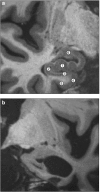The episodic memory system: neurocircuitry and disorders
- PMID: 19776728
- PMCID: PMC2882963
- DOI: 10.1038/npp.2009.126
The episodic memory system: neurocircuitry and disorders
Abstract
The ability to encode and retrieve our daily personal experiences, called episodic memory, is supported by the circuitry of the medial temporal lobe (MTL), including the hippocampus, which interacts extensively with a number of specific distributed cortical and subcortical structures. In both animals and humans, evidence from anatomical, neuropsychological, and physiological studies indicates that cortical components of this system have key functions in several aspects of perception and cognition, whereas the MTL structures mediate the organization and persistence of the network of memories whose details are stored in those cortical areas. Structures within the MTL, and particularly the hippocampus, have distinct functions in combining information from multiple cortical streams, supporting our ability to encode and retrieve details of events that compose episodic memories. Conversely, selective damage in the hippocampus, MTL, and other structures of the large-scale memory system, or deterioration of these areas in several diseases and disorders, compromises episodic memory. A growing body of evidence is converging on a functional organization of the cortical, subcortical, and MTL structures that support the fundamental features of episodic memory in humans and animals.
Figures








References
-
- Aggleton JP, Brown MW.1999Episodic memory, amnesia, and the hippocampal-anterior thalamic axis Behav Brain Sci 22425–444.discussion 444-89. - PubMed
Publication types
MeSH terms
Grants and funding
LinkOut - more resources
Full Text Sources
Other Literature Sources
Medical

